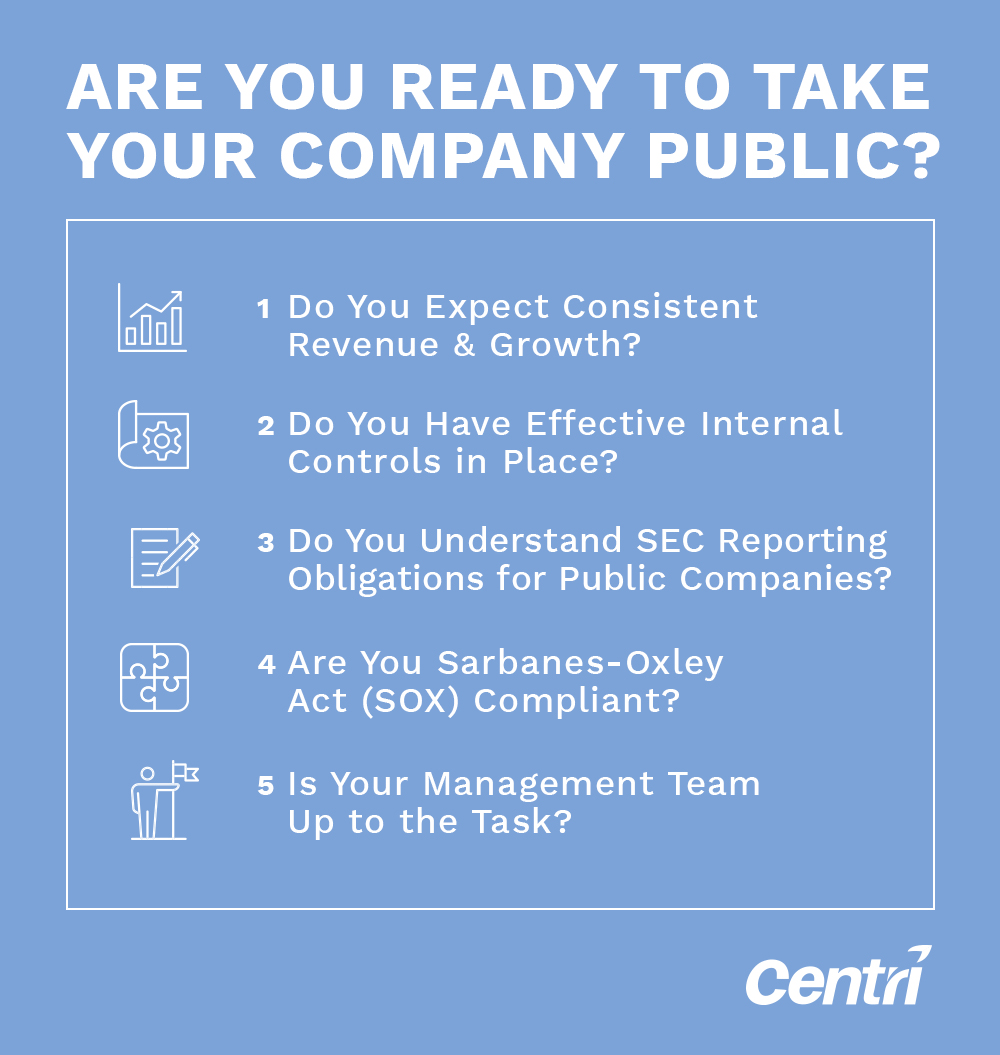Going Public, Part I: Initial Planning & Securing IPO Readiness Services
The opportunity of taking your company public can be extremely exciting, but it’s important to understand that this process is both time-consuming and expensive. However, the better prepared you are to go public (and exist as a public company in the future), the smoother things will go.
IPO readiness advisory services help you take an in-depth look at your business, allowing you to determine whether you’re ready to go public and if an IPO is right for you in the first place. And if you decide to move forward, experienced IPO consultants (like the Centri team) can help you close existing gaps and make the enhancements necessary for life as a public company.
Part one of a six-part series, this blog is designed to help you decide whether an IPO is right for your business and understand the benefits of IPO readiness services. Our goal is to provide expert IPO help and adequately prepare you for the next steps in the going public process.
What Is An Initial Public Offering (IPO)?
An initial public offering (IPO) takes place when a private company makes shares available to the public through the issuance of new stock on a public equity index for the first time. While private companies may have shareholders and issue stocks, these shares cannot legally be traded on public exchanges due to federal securities laws. After taking your company public, you’ll receive the proceeds of newly sold stocks in the form of additional capital, which you can use for many purposes.
Are You Ready to Take Your Company Public?
While you may think you’re ready to go public, this important decision shouldn’t be taken lightly. If you’re wondering, “when is a company ready for an IPO?”, start by asking yourself the following five questions.

1. Do You Expect Consistent Revenue & Growth?
Success on the capital markets starts with proving you’re a better choice than the competition and are capable of completing a successful IPO. Shareholders want to see a return on their investment, so you should be able to demonstrate a track record of consistent revenue and sales growth.
You should be able to provide realistic financial projections that prove the profitability of your product or service will continue to grow. Additionally, you’ll need a strong business plan, a management team that’s ready to go public, and products or services that appeal to a large number of consumers.
2. Do You Have Effective Internal Controls in Place?
According to the Public Company Accounting Oversight Board (PCAOB), your internal controls must “provide reasonable assurance regarding the reliability of financial reporting and the preparation of financial statements for external purposes in accordance with generally-accepted accounting principles (GAAP).”
A successful IPO requires you to have strong internal controls over financial reporting in place before you go public. Along with preparing you for life as a public company, this transparency is one of the best ways to grow your business.
Not sure how to assess your current internal controls? Start by ensuring you have a well-established reporting process, stable financial reporting controls, and a strong corporate structure.
3. Do You Understand SEC Reporting Obligations for Public Companies?
Unlike private businesses, public companies are required to file quarterly (Form 10-Q) and annual (Form 10-K) reports with the Securities & Exchange Commission (SEC). These documents provide transparency for investors, regulators, and analysts and must satisfy the SEC’s strict guidelines.
Your reports are due soon after the end of each period, which can be challenging due to the amount of time and effort involved. You may not have the processes and internal controls necessary to complete SEC reporting in place, which is an important consideration if you’re considering going public.
4. Are You Sarbanes-Oxley Act (SOX) Compliant?
The Sarbanes-Oxley Act (SOX) of 2002 created more stringent recordkeeping requirements for accountants, financial officers, and auditors, along with harsh criminal penalties for violating securities laws. Its provisions also significantly increased the amount of work for private companies that are prepping for an IPO.
SOX Section 404 (Management Assessment of Internal Controls) undoubtedly had the greatest impact on the IPO process. This section stipulates that public companies must include a report with their annual SEC filings stating that management is responsible for implementing an adequate internal control structure. Additionally, an external auditor must attest to the accuracy of this information.
5. Is Your Management Team Up to the Task?
Success as a public company requires your management team to be fully committed to both the IPO process and your organization’s long-term success. You must also be ready to enhance your financial reporting processes and internal controls. If your executive team and board of directors lack the experience necessary to go public, your best bet is to work with a team of IPO readiness consulting experts.

Benefits of Going Public
If you’re a good candidate for an IPO, there are many benefits of going public. We’ll take a closer look at each of these advantages below.
Access to More Capital
Because you’re issuing stock to a much larger market, going public gives you access to large amounts of capital. Additionally, it can provide opportunities for future funding, which can be used to bolster your business in a variety of ways.
Increased Stock Liquidity
Once you’ve completed the IPO process, your original stakeholders may want to liquefy their stock and cash in on their investment. A capital markets listing makes it much easier for them to sell shares, and they’re also likely to get a better return on their initial expenditure.
Ability to Attract Better Talent
Going public also improves your chances of attracting top-notch talent since you can offer additional compensation through employee stock ownership (ESOP). While salary is still important, some prospects may be more persuaded by the valuable opportunity to own shares in your company.
Heightened Exposure & Credibility
Newly-public companies are earmarked on the capital markets to call them out, which can significantly boost your sales and profits. This exposure and brand visibility also enhances your reputation and credibility, which can make your stock more appealing.
Additionally, the transparency that accompanies life as a public company may give lenders more confidence in your financial statements, which often leads to better loan terms. Plus, it can increase your company’s market value due to increased liquidity and enhanced visibility.
Better Acquisition Prospects
Another benefit of an IPO is the ability to use the proceeds from your publicly-traded stock to acquire or merge with other companies. This leaves you with more capital for other essential business functions, like research and development or recruiting the brightest talent.

Downsides of Going Public
There are also several drawbacks of going public to consider before initiating the IPO process. We’ll take a closer look at each of these in the following sections. As you consider these factors, keep in mind that pre-IPO advisory services and working with a team of experts can alleviate them.
Significant Financial Investment
Depending on your unique situation, going public can take several years and cost millions of dollars. When preparing to go public, you’ll be responsible for a variety of expenses, including SEC filing fees, underwriting charges, accounting and legal advisory expenses, and exchange listing fees.
It’s also crucial to understand the many new expenses that come with running a public company, like:
- Directors & officers (D&O) liability insurance
- Salaries for newly-created positions
- Independent auditor costs
- Quarterly and annual reporting expenses
- Compliance fees
- Investor relations costs
Increased Shareholder Involvement
The process of going public involves selling stocks to a large group of diverse shareholders, all of whom expect a return on their investment. An inability to meet their expectations can hurt your public image and negatively impact your business valuation and reputation.
Having more stakeholders also puts you at risk of shareholder lawsuits, especially when it comes to SOX compliance. Plus, you’re more vulnerable to the impact of activist investors who seek board seats or voting rights.
Reduced Control & Influence
An increased number of shareholders can reduce your ownership and overall authority, although this is lessened if your management team and board of directors maintain effective control. You may also be more susceptible to unwanted acquisitions or hostile takeovers from shareholders.
Diminished Confidentiality & Privacy
The extensive quarterly and annual financial reporting the SEC requires of public companies forces you to disclose delicate information that was previously kept private. This gives employees, customers, and competitors access to your gross profit, net income, primary customer base, management compensation, and more.
Complicated Investor Relationships
Going public also requires you to keep your stakeholders happy, manage activist investors, and handle large volumes of shareholder questions. You’ll also have to prepare for roadshows and mock presentations designed for analysts and shareholders.
What is Your Company’s Filer Status?
The first step in preparing to go public is determining your filer status, which plays a key role in establishing the reporting requirements you’ll need to satisfy during and after your IPO. There are a variety of filer statuses, which we’ll review in more detail below.
Emerging Growth Company
The Jumpstart Our Business Startups (JOBS) Act of 2012 created the emerging growth company (EGC) issuer status to reduce the extensive filing and disclosure requirements required during IPOs. To qualify as an EGC, you must meet these key criteria from Section 2(a)(19) of the Securities Exchange Act of 1934:
- Your total annual gross revenue during your most recently-completed fiscal year must be $1.07 billion or less.
- You must not have sold common equity securities under an IPO registration statement after December 2011.
If you qualify as an emerging growth company, you’ll continue to be classified as such for the first five fiscal years after completing your IPO, unless:
- Your total annual gross revenue exceeds $1.07 billion.
- You issue more than $1 billion in non-convertible debt over a span of three years.
- You become a large accelerated filer as defined in Exchange Act Rule 12b-2.
Here are a few of the biggest benefits of entering the IPO process as an emerging growth company:
- You’re not required to provide an auditor attestation of your internal control over financial reporting (ICFR) as stipulated in SOX 404(b).
- You’re not required to comply with new or revised financial accounting standards under U.S. GAAP until those rules also apply to public companies.
- You’re able to submit your IPO registration statements to the SEC confidentially, allowing you to keep sensitive information private until you receive your comment letters and decide whether you still want to go public.
- You may use streamlined executive compensation disclosures and are exempt from the shareholder advisory votes on executive compensation that are required by the Dodd–Frank Wall Street Reform and Consumer Protection Act.
- You’re exempt from any PCAOB rules that (if adopted) would mandate the audit firm rotation and auditor discussion/analysis that’s typically part of any financial statement audit.
- You may provide audited financial statements during the IPO process for two fiscal years, rather than three.
- You may use “test the waters” communications with qualified investors during the quiet period to gauge interest in your IPO.
Smaller Reporting Company
Classification as a smaller reporting company (as defined in Item 10(f)(1) of Regulation S-K) allows you to prepare your disclosures based on requirements specifically designed for smaller businesses. This designation is based on your public float (number of common shares held by non-affiliates multiplied by market price) and annual revenue.
As a smaller reporting company, you may include less-detailed information in your executive compensation disclosures. You may also provide audited financial statements for two fiscal years, rather than three. And like EGCs, you’re not required to include an auditor attestation of your assessment of ICFR per SOX 404(b).Smaller reporting companies can be broken down into two sub-categories: accelerated filers and non-accelerated filers. Smaller reporting companies designated as accelerated filers must:
- Have a public float of $75-249 million
- Have annual revenues of at least $100 million
- Maintain all disclosure controls and procedures (DCP)
- Meet the requirements of SOX 404(a)
On the other hand, smaller reporting companies designated as non-accelerated filers must:
- Have a public float of less than $250 million or annual revenues of less than $100 million with either no public float or a public float of less than $700 million
- Maintain all disclosure controls and procedures (DCP)
- Meet the requirements of SOX 404(a)
Accelerated Filer
The definitions of accelerated filers and large accelerated filers contained in Rule 12b-2 of the Exchange Act were revised in 2020. These amendments are designed to preserve capital and reduce filing and compliance burdens for some smaller issuers while still maintaining investor protections.
If you qualify as an accelerated filer, you aren’t required to include an auditor attestation of your assessment of ICFR per SOX 404(b) until after 12 calendar months. However, you’re still obligated to maintain DCP and ICFR per SOX 404(a). To be designated as an accelerated filer, you must have:
- A public float of $75-$699 million
- Annual revenues of $100 million or more
- Been subject to the reporting requirements of Section 13(a) or 15(d) of the Exchange Act for at least 12 calendar months
- Previously filed at least one annual report under Section 13(a) or 15(d) of the Exchange Act
Large Accelerated Filer
If you qualify as a large accelerated filer, you aren’t required to include an auditor attestation of your assessment of ICFR per SOX 404(b) until after 12 calendar months. But like other filer statuses, you’re still obligated to maintain DCP and ICFR per SOX 404(a).
To be designated as an accelerated filer, you must have:
- A public float of at least $700 million
- Annual revenues of $100 million or more
- Been subject to the reporting requirements of Section 13(a) or 15(d) of the Exchange Act for at least 12 calendar months
- Previously filed at least one annual report under Section 13(a) or 15(d) of the Exchange Act
IPO Readiness Advisory Services from Centri
As you can see, making the decision to go public and starting your initial planning is an intricate process. If you’re not sure what’s right for your business or feel unequipped to handle the preparation we outlined above, IPO readiness consulting services from Centri is a great place to start.
Our IPO advisory consultants can provide a wide variety of advisory services, including:
- Comprehensive project management, best practices, and strategies
- Audit support as you prepare for PCAOB-compliant audits
- Valuation services, like 409A analyses, cheap stock, deferred compensation expense calculations, and other fair value considerations
- Assistance converting from one accounting basis to another (e.g. conversions from home country GAAP to U.S. GAAP or International Financial Reporting Standards)
- Assistance with preparation of compliant interim information
- Preparation of technical accounting memorandums, including earnings per share considerations and segment- or entity-wide disclosures
- Guidance on any required organizational or process adjustments
Ready to take your company public and sell your stock on the capital markets? Centri’s IPO readiness advisory services take the guesswork out of prepping. Contact us today to learn more or continue reading Part II of our IPO Blog Series.
About Centri Business Consulting, LLC
Centri Business Consulting provides the highest quality advisory consulting services to its clients by being reliable and responsive to their needs. Centri provides companies with the expertise they need to meet their reporting demands. Centri specializes in financial reporting, internal controls, technical accounting research, valuation, mergers & acquisitions, and tax, CFO and HR advisory services for companies of various sizes and industries. From complex technical accounting transactions to monthly financial reporting, our professionals can offer any organization the specialized expertise and multilayered skillsets to ensure the project is completed timely and accurately.
3 Logan Square
26th Floor
1717 Arch Street
Philadelphia, PA 19103
530 Seventh Avenue
Suite 2201
New York, NY 10018
4509 Creedmoor Rd
Suite 206
Raleigh, NC 27612
615 Channelside Drive
Suite 207
Tampa, FL 33602
1175 Peachtree St. NE
Suite 1000
Atlanta, GA 30361
50 Milk St.
18th Floor
Boston, MA 02109
1775 Tysons Blvd
Suite 4131
McLean, VA 22102
One Tabor Center
1200 17th St.
Floor 10
Denver, CO 80202
1-855-CENTRI1
virtual@CentriConsulting.com
Index